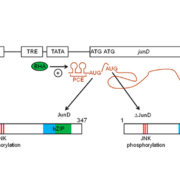Publication in Leukemia
Jean-Marie PELOPONESE publishes an article in “Leukemia” (IF=11.7): how HTLV-1 hijacks the translational machinery to induce proliferation of the infected T cell (Terol et al, 2017).
Adult T-cell leukemia (ATL) is an aggressive and fatal malignancy of mature activated CD4+ T lymphocytes associated with human T-cell leukemia virus type 1 (HTLV-1). The diversity in clinical features has led to a classification into four clinical forms of ATL: smouldering, chronic, acute, and lymphoma-type. The pathological effects of the most aggressive forms, acute and lymphoma type, include multiple visceral lesions, mainly with infiltration of various organs including skin, spleen, liver and lungs. About 4% of HTLV-1-infected individuals develop ATL, with disease onset occurring after a prolonged latency period of up to 30-50 years post-infection. T-cell survival and proliferation in carriers are promoted by viral infection, which explains how HTLV-1-infected T cells are able to persist in the T-cell population for such a long period of time.
In this paper J.-M. PELOPONESE, project leader in the team « Players in the pathogenesis of the retroviral infections », demonstrates that HBZ is able to induce the expression of a JunD isoform called delta-JunD. JunD mRNA is intronless but can generate two protein isoforms by alternative translation initiation: JunD full-length and delta-JunD, an N-terminal truncated form unresponsive to the tumor suppressor menin. In order to decipher the mechanisms for delta-JunD production, he looked into the translational machinery and observed that HBZ induces nuclear retention of RPS25 mRNA and loss of RPS25 protein expression, a component of the small ribosomal subunit. Therefore HBZ bypasses translational control of JunD uORF and favors the expression of delta-JunD. In addition, he demonstrates that, unlike JunD, delta-JunD induces proliferation and transformation of cells. In conclusion, this paper provides strong evidences that HBZ induces delta-JunD expression through alteration of the cellular translational machinery and that the truncated isoform delta-JunD plays a central role in the oncogenic process leading to ATL.
Figure: Molecular organization of JunD mRNA. JunD mRNA can generate two protein isoforms by alternative translation initiation, JunD full-length and delta-JunD.








